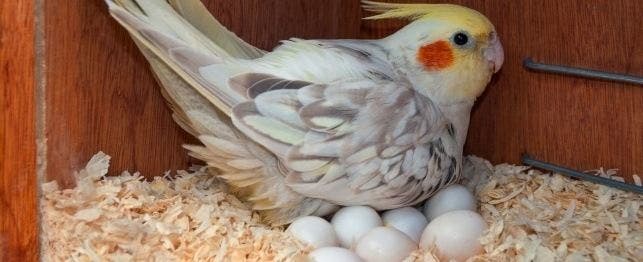
Breeding Your Cockatiel
Breeding birds is not as simple as it sounds, and breeding your cockatiel is a decision that should only be made after a lot of research and talking with experienced breeders. To safeguard the health of your bird and his or her offspring, you need to be able to handle any situation you encounter.
Make sure you have the time and money necessary, as well as easy access to an experienced avian veterinarian. Also make sure you already have homes lined up for the new babies. If you are properly prepared, breeding can be a positive experience.
Breeding
If you want to breed your cockatiels, make sure they are mature and healthy. Breeding birds need to bond and get used to their surroundings. The birds must be well fed and their new spacious cage must be clean.
Cockatiels can breed when they are 1 1/2 years old. They will breed almost year-round but should be made to rest so they do not become exhausted. If they are bred outdoors, they should rest in the summer because the chicks don’t tolerate heat well and will have health problems, especially the weaker mutations.
The breeding cage for a pair can be 2 feet by 2 feet by 3 feet long with a nest box hung on the outside. The nest box should be approximately 8 inches by 8 inches by 10 inches tall and should have about 2 inches of pine shaving as bedding. The hen can lay three to eight eggs per clutch but there are usually four to five. Incubation period is 21 days.
Both parents care for the young until they are ready to fledge (emerge from the box) when they are 4 to 5 weeks old.
If you have several pairs you can reduce the burden on a single hen by moving eggs or chicks between nests. It is best to have a hen raise only four chicks. Chicks fledge at 4 to 5 weeks and, if allowed, will stay with the parents for another month. When hand-fed, chicks wean at 6 to 7 weeks. If you choose to hand-feed your chicks, it’s best to leave them with the parents until they are about 3 weeks old. At that age they can be fed hand-rearing formula three to four times daily.
Care of Chicks
You will need to check the nesting box every day to make sure the chicks are being fed properly. Offer fresh food and plenty of water daily. If the parents care for their young, you will not have to worry too much. However, first time or inexperienced parents may not care for their young, which means you have to care for them.
Hand-rearing chicks takes time and the right equipment. You may need to place them in an incubator and hand feed them every 2 hours (commercial diets are available, to which you just add water). The feeding technique is not difficult to learn, but you should have your avian veterinarian show you how to do it properly. This is a critical period in the life of the new birds and it is during this time you may encounter a high rate of complications and mortality.
Soon the new chicks will slowly start to pick at smaller (cracked) seeds you offer. Once you are sure they can eat by themselves, it is time to separate the chicks, some sooner than others, from the parents and start the taming the process.